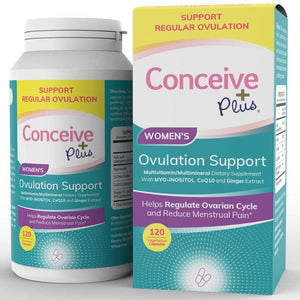Why is my Period Delay? 12 Reasons of Late Period

Related products
12 Reasons for Late Period
A period known as the menstrual Period is monthly bleeding in females. The bleeding is part of the menstrual cycle, a process by which the female uterus prepares for a possible pregnancy. It typically begins when she starts her Period and ends when the next menstruation occurs.
A period is the shedding of the lining of the uterus once a month, triggered by hormones. Every four or so weeks, the body gets a surge of the hormone progesterone after ovulation, which signals the uterine lining to thicken. Thickening of the uterine lining happens to get the uterus prepped and ready for the implantation of the fertilised egg. But if this doesn't happen, the hormone levels drop, and the bleeding starts.
A period looks very different from one person to another. The first three days are usually expected to have heavy bleeding. It's common for a period blood to change colour and consistency throughout the Period. It often starts bright red when its new, fresh blood emerges from the uterus. As the days go on and the blood gets older, it tends to become a dark brown. But this, too, varies from one female to another. Sometimes a lot is noticed on pads; as a result of blood collected in the vagina or uterus coming out in one go.
Period delay is when the menstrual Period of a female does not occur by the time it is supposed to. A period is delayed due to several reasons. Some of the common causes include pregnancy.
The average menstrual Period is expected to last between 21 and 35 days, with an average of 28 days. Once the Period starts, women typically bleed for 3 to 7 days. Any deviation from this is a period delay secondary to multiple conditions.
The 12 most common reasons for a period delay are pregnancy, exercise, birth control, stress, perimenopause, obesity, thyroid problems, medications, chronic disease, polycystic ovary syndrome, premature ovarian insufficiency, and a pituitary tumour.
1. Pregnancy
Pregnancy is the most common cause of a period delay in a woman in her reproductive age. Pregnancy causes a delay and absence in the menstrual cycle due to hormonal changes, implantation, and changes in the cervix.
Pregnancy is the condition of a woman when one or more fetus begins to develop inside her womb. One of the most common signs of pregnancy is a missed period or period delay. Women with late periods experience other common pregnancy symptoms such as morning sickness, food cravings, nausea/vomiting, fatigue, breast tenderness, and mood swings. When the period delay is suspected to be due to pregnancy, it's best to take a home pregnancy test to be sure.
Pregnancy causes a delay in a woman's Period due to hormonal changes, followed by physiological changes that occur during pregnancy.
During pregnancy, the female body undergoes a series of complex hormonal changes. The primary hormone in pregnancy is human chorionic gonadotropin (hCG), produced by the developing embryo after uterine implantation. The production of hCG starts shortly after conception and increases rapidly in the early weeks of pregnancy.
One of the effects of hCG is to suppress the production of other hormones responsible for regulating the menstrual cycle, such as follicle-stimulating hormone (FSH) and luteinizing hormone (LH). FSH and LH play crucial roles in the menstrual cycle by stimulating the growth and maturation of ovarian follicles, which release an egg during ovulation. However, during pregnancy, the production of FSH and LH is reduced, leading to a decrease in follicular development and ovulation.
In addition to hormonal changes, the implantation of the fertilized egg in the uterine lining causes changes that delay the onset of menstruation. After fertilization, the developing embryo travels through the fallopian tube and into the uterus, where it attaches to the uterine lining in an implantation process. Implantation causes minor bleeding and disrupts the normal shedding of the uterine lining that occurs during menstruation. Implantation delays the onset of menstruation or even causes it to be skipped altogether.
Moreover, during pregnancy, the cervix, the lower part of the uterus that connects to the vagina, changes its structure and position. The cervix becomes softer and closes tightly to protect the developing fetus from infections. These changes in the cervix contribute to a delay in menstruation as they prevent menstrual blood from flowing out of the uterus.
It's important to note that a missed period does not always indicate pregnancy. Other factors that cause a delay in menstruation include stress, changes in weight, hormonal imbalances, certain medical conditions, or the use of certain medications. However, if sexually active and there is a period delay, it is essential to consider the possibility of pregnancy and take a home pregnancy test or consult a healthcare professional to confirm or rule out pregnancy.
2. Exercise
Physical exercise is any bodily activity that enhances or maintains physical fitness and overall health, such as brisk walking, running, jogging, swimming, etc. Exercise is known to have numerous benefits for overall health and well-being. However, intense or excessive exercise sometimes impacts the menstrual cycle and causes a delay in periods, especially in women who engage in rigorous training or endurance sports.
A sudden increase in exercise frequency results in late periods due to changes in levels of hormones within the body system. The mechanism through which exercise causes period delay is that When a certain amount of physical activities is exceeded, it leads the body into stress mode where cortisol production increases, eventually leading up to temporary disruption in reproductive hormone function, making ovulation harder or none existing, which then results in late period issues.
Several factors contribute to how intense exercise leads to a delay in the menstrual cycle. The factors include hormonal changes, energy deficiency, increased stress, and body weight and composition alterations. Hormonal changes involve an increase in stress hormones, such as cortisol, and a decrease in reproductive hormones, such as luteinizing hormone (LH) and follicle-stimulating hormone (FSH), responsible for regulating the menstrual cycle. Energy deficiency occurs when the body burns more calories than it takes in, leading to decreased body fat and low energy availability. Increased stress from exercise disrupts the normal hormonal balance in the body, affecting the hypothalamic-pituitary-adrenal (HPA) axis, which regulates the menstrual cycle. Exercise leading to weight loss and changes in body fat and composition impacts the production of reproductive hormones and the menstrual cycle. However, it is important to note that the impact of exercise on menstrual cycles varies widely among individuals, and some women still experience regular menstrual cycles despite engaging in intense exercise. If a delay in periods or irregular menstrual cycles occurs, it is important to consult with a healthcare professional for evaluation and appropriate management. It involves adjusting exercise routines, improving nutrition, managing stress, and ensuring adequate energy availability to support overall health, including reproductive health.
3. Birth control
Birth control methods are used to prevent pregnancy in a woman. Many individuals take birth control to prevent pregnancy or to manage other health conditions, although it's important to know that it alters how periods come. Birth control methods, such as hormonal contraceptives like pills, patches, injections, IUDs, and implants, work by changing the hormones in the body, which affects the menstrual cycle. Birth controls result in changes like Period delay, making it longer, shorter, or absent. Period delay differs for people, depending on their age, health, and the type of hormonal formulation of the contraceptive.
Birth control methods like a combination (of estrogen and progestin) hormonal contraceptives are more likely to delay periods. At the same time, progestin-only pills or IUDs still make ovulation happen, which leads to irregular bleeding or spots. Although period delay is sometimes desired, it causes worries if one is used to regular periods or is concerned about fertility changes. In addition, breakthrough bleeding or spotting is sometimes seen in the first few months of a new contraceptive, which is generally not alarming.
Non-hormonal birth control, like copper IUDs, typically doesn't cause period delay or other changes. However, these methods sometimes cause heavier or more painful periods. It's important to understand how birth control affects periods. Depending on the type and individual factors, it leads to a period delay or other changes. If any doubts or worries, communicate them to the healthcare provider.
4. Stress
Stress is an unpleasant state caused by an emotional or internal stimulus resulting from pressure on an individual's mental and physiological states; it is usually experienced when a person feels overwhelmed with workload/demands placed upon them beyond their capacity level.
Mood swings, lack of concentration, and weak immune system are some general signs that might point towards high levels of stress affecting individuals' everyday life; meanwhile, missed periods is one symptom since increased amounts of stress affect hormonal balance negatively, causing irregular patterns for the menses cycle.
Stress has a considerable influence on one's mental and physical well-being. It especially disrupts the menstrual cycle. Stress triggers the hypothalamic-pituitary-adrenal (HPA) axis, which further causes a shift in hormone production throughout the body. Stress leads to a delay in periods. Stress induces the release of cortisol, which decreases one's reproductive hormones- luteinizing hormone (LH) and follicle-stimulating hormone (FSH) and interfere with the normal signals that trigger ovulation and, thus, a delay in periods.
Stress disrupts the regular ovulation process, resulting in irregular or missed ovulation and, consequently, a delay in periods. It impacts the regularity of the menstrual cycle itself- changing the timing and length of it, leading to a delay in periods.
Psychological factors, such as sleep patterns and overall well-being, are affected by stress, which further impacts the body's hormonal regulation and might delay periods. However, it is important to note that the reaction of one's body to stress differs from another's. Some women experience a delay in periods during relatively low go on low stress, while others don't. Thus, it is essential to manage stress effectively by practicing relaxation techniques, self-care, and seeking professional help, if necessary, to help regulate the menstrual cycle and keep reproductive health in check.
5. Perimenopause
Perimenopause is the time before menopause when women experience hormonal changes indicating the end of their menstruation cycles. It usually begins when a woman reaches age 40-50, lasting for several months or even a few more years, resulting in missed periods commonly known as amenorrhea.
Perimenopause is a natural period of transition in a woman's life. During this time, the body begins to experience significant hormonal changes as it prepares for the end of a woman's reproductive life. The hormonal changes have complex effects on a woman's body, including a delayed menstrual cycle and the eventual cessation of menstruation, commonly known as menopause. Fluctuating levels of hormones such as estrogen and progesterone cause body changes that lead to physical and emotional symptoms.
The most common signs and symptoms of perimenopause include
- irregular periods
- hot flashes
- Fatigue
- night sweats
- mood changes
- vaginal dryness
- sleep disturbances
- changes in libido, and
- urinary problems.
While some women experience mild symptoms, others experience more severe ones requiring treatment.
The hormonal fluctuations cause irregularity in the menstrual cycle. As the ovaries produce less estrogen, the hormonal balance in the body is disrupted, leading to changes in the timing and regularity of periods. One common way that perimenopause causes a period delay is through anovulatory cycles. Anovulation occurs when the ovaries do not release an egg, which is necessary for a regular menstrual cycle. During perimenopause, hormonal fluctuations disrupt the regular ovulation process, leading to cycles where ovulation does not occur. The menstrual cycle is sometimes irregular without ovulation, and periods be delayed or skipped altogether. Another factor that contributes to period delay during perimenopause is the thinning of the uterine lining. As estrogen levels decline, the uterus lining becomes thinner, resulting in less tissue to shed during menstruation. Thinning of the uterine lining leads to lighter or delayed periods.
Lowered hormone activities within the body system cause alterations within the hypothalamus, leading to irregular ovulation and a delayed timeframe for menses occurrence; regular usage of hormone replacement therapy medications might reduce risk and help prevent such occurrences.
6. Obesity
Obesity, or excess body weight, has become a prevalent health issue worldwide. Excessive fat deposition all over the human body is considered overweight according to BMI measurements, making them susceptible to obesity-related illnesses if left untreated. The normal range for BMI is between 18.5 -24.9. When BMI is between 25.0 to 29.9, it is in the overweight range, and a BMI of 30.0 or higher is within the obese range.
Obese women have profound physical characteristics such as enlarged waist circumference and increased circumference of hips/thighs, in addition to psychological disturbances such as low self-esteem and depression, which are commonly observed among obese people; meanwhile, missing out on Period or late periods occur due to resistance towards insulin caused by excessive fat deposition disrupting within hormones balance leading up to menses miss cycles.
Obesity is associated with numerous health risks, including an increased risk of chronic conditions such as diabetes, cardiovascular disease, and certain cancers. Additionally, obesity impacts the menstrual cycle in women, leading to period delay or other changes.
Being overweight causes an imbalance in the body's hormones, which then causes irregularities in a person's Period. Fat cells produce estrogen, and too much estrogen hormone due to excess fat tissue disrupts regular hormonal signals that regulate menstrual cycles, leading to delayed or irregular periods.
Insulin resistance is another condition linked with obesity. It affects how one's cells react to insulin, making it difficult for a healthy balance between progesterone and estrogen levels necessary for normal menstruation cycles. As well as these physical connections, there are other illnesses related to obesity, such as polycystic ovary syndrome (PCOS), that contribute towards delays in one's cycle by causing additional hormonal imbalances, such as increased production of insulin and estrogen.
The short-term effects of having delayed or irregular periods tend to be inconvenient. Still, long-term issues have more serious implications on fertility while increasing risk factors associated with endometrial hyperplasia - thickening of the uterus lining - something connected heavily with cancer cases within women, specifically affected by PCOS. When facing any concerns over period delay potentially related to weight gain, management changes must be made through healthier eating habits alongside exercise, and seeking professional advice to help determine if further medical intervention is needed relating directly to treating potential underlying conditions like PCOS or lack/abundance in certain hormones, etc.
Managing our health, including maintaining fitness goals, restore regularity when dealing solely with matters concerning menstruation, whether we're discussing those who suffer from typical irregularities or complications caused simply because they carry extra pounds than average individuals do.
7. Thyroid Problems
The thyroid, a butterfly-shaped gland in the neck, regulates the body's metabolism and hormonal balance. When the thyroid function is impaired, it affects the menstrual cycle, leading to period delay.
The thyroid gland produces two major hormones, triiodothyronine (T3) and thyroxine (T4), which help regulate metabolism, energy production, and growth. When the thyroid becomes overactive or underactive, it leads to an imbalance in the body's hormone levels resulting in menstrual irregularities. In hyperthyroidism, there is usually a higher-than-normal level of thyroid hormones that result in increased metabolism with irregular cycles, including faster periods with a lighter flow or missed periods altogether. With hypothyroidism, however, due to insufficient hormone production, cycles become longer, lasting heavier, and delayed period issues arise from this condition.
A combination of higher progesterone and lower estrogen levels present within the body due to hypothyroid disease disrupts the regular menstrual cycle as there is a disruption in hormone production activity.
Various symptoms appear depending on the severity of both conditions, such as rapid heartbeat with weight loss seen commonly alongside anxiety/irritability when hyperthyroid occurs. In contrast, fatigue, sluggishness & depression plus cold intolerance/dry skin exists if suffering from hypothyroid disease, respectively. Other less common signs include tremors, sensitivity towards heat, changes in bowel habits, muscle weakness & constipation- which vary from person to person without any obvious detection. Ultimately early diagnosis is highly recommended for optimal outcomes since untreated either disorder causes permanent damage to the human system.
8. Medications
Drugs or medications are used for treating various medical conditions, specifically prescription drugs, over the counter medicines, which need assessment from a qualified doctor before use. Medications are an essential part of medical treatment for various health conditions. However, some medications impact the menstrual cycle, delaying the Period.
Unwanted side effects that follow when using medications include nausea/vomiting, hair loss problems, skin dryness, etc., associated with some medicine usage. Meanwhile, late periods (amenorrhea) indicate medicine consumption causing irregular reproductive system activities.
Medications cause Periods to delay through several mechanisms, which vary depending on the type of medication and its impact on hormonal balance. Long-term use of certain medication types leads up to changes in chemical balance inside the human body, leading to disruption in hormonal patterns, most commonly concerning female hormones, thus interfering ovulation process and making it harder, eventually resulting in delayed period issues when menses don't appear on time according to normal criteria set by individual woman's organism efficiency levels.
Some common mechanisms include hormonal disruption, endocrine disruption, and side effects of medications.
Hormonal disruption occurs when medications, including hormonal contraceptives such as birth control pills, patches, or injections, alter the hormonal signals that regulate the menstrual cycle. The hormonal disruption suppresses ovulation, thins the uterine lining, or affects the levels of estrogen and progesterone, potentially leading to changes in the menstrual cycle and period delay.
Endocrine disruption occurs when medications interfere with the function of the endocrine system, which plays a crucial role in regulating hormonal balance in the body. For example, medications used to treat medical conditions like polycystic ovary syndrome (PCOS) or thyroid disorders impact the hormonal signals that regulate the menstrual cycle, potentially causing a period delay.
Some medications have direct side effects that impact the menstrual cycle. For example, medications used for chemotherapy or other cancer treatments, anticoagulants, or corticosteroids affect the normal hormonal balance in the body and cause period delay as a side effect.
9. Chronic Diseases
Long-term diseases occur over a prolonged period, usually due to bad habits kept alive by patients, like smoking/drinking, etc., and require long-term monitoring by medical practitioners to achieve the best outcome.
Most chronic diseases are difficult to detect since they lack some common symptoms experienced during illnesses while having late periods is one sign pointing to the possibility of this particular disease being present inside someone's organism; added that with other signs such as losing appetite, gaining weight and fatigue providing more evidence concerning disease presence.
Dysfunction among endocrine glands associated with certain types of chronic illnesses causes hormonal imbalances, which then interfere with proper metabolic activities leading to disruption in menstrual patterns and causing later periods than usual values set according to normal criteria mentioned inside an individual woman's physiology parameters.
10. Polycystic Ovarian Syndrome(PCOS)
Polycystic ovary syndrome (PCOS) is a hormonal disorder that affects women of reproductive age, and one of its common symptoms is irregular menstrual cycles or period delay. PCOS is a condition that affects the ovaries, the organs responsible for producing eggs and regulating the menstrual cycle. It is estimated that 1 in 10 women of childbearing age is affected by PCOS, making it a prevalent reproductive health issue.
A polycystic ovarian syndrome is a common disorder among females affecting their bodies' proper functioning. It usually occurs during the childbearing years, causing various reproductive issues if left untreated; it is usually diagnosed through physical examination, blood tests, and ultrasounds.
PCOS is primarily characterized by ovulatory dysfunction and hyperandrogenism. The syndrome is heterogenous clinically and biochemically. It encompasses a spectrum of variably associated clinical features:
- Cutaneous signs of hyperandrogenism(eg, hirsutism, moderate-severe acne)
- Menstrual irregularity (e.g., oligo- or amenorrhea or irregular bleeding)
- Polycystic ovaries (one or both)
- Obesity and insulin resistance
Women with PCOS issues experience cysts formation within their ovaries in addition to the irregular menstrual cycle. At the same time, late periods associated with heavy bleeding occur due to the presence of this disorder.
Polycystic ovarian syndrome leads to an imbalance among female hormone production rates, which disrupts the proper functioning ovulation process leading to missed/late period issues. Additionally, malfunction of the hypothalamus gland causes further disruption in hormonal balance, making it hard for egg cell release resulting in menses miss even after a long incubation time lapse.
PCOS is characterized by multiple small cysts in the ovaries and immature eggs that have not fully developed. The cysts disrupt the normal hormonal balance in the body, leading to various symptoms, including period delay.
Estrogen is a main hormone that plays a crucial role in regulating the menstrual cycle. In PCOS, there is an imbalance in the levels of estrogen, progesterone, and luteinizing hormone (LH) in the body. The hormonal imbalance disrupts the normal menstrual cycle, leading to irregular or missed periods.
There are several reasons why PCOS causes period delay:
- Anovulation: PCOS disrupts the normal ovulation process. Ovulation is the release of a mature egg from the ovary, which then travels to the uterus in preparation for fertilization. In PCOS, the eggs do not mature properly due to hormonal imbalances, leading to a lack of ovulation or anovulation. Without ovulation, there is no release of an egg for fertilization, which results in a period of delay.
- Hormonal Imbalance: PCOS disrupts the normal hormonal balance in the body, leading to elevated estrogen levels and lower progesterone levels. The hormonal imbalance causes the lining of the uterus (endometrium) to grow excessively, leading to heavy or prolonged periods. However, when the endometrial lining is not shed properly, it results in a period of delay.
- Insulin Resistance: Insulin resistance, a common condition associated with PCOS, contributes to period delay. Insulin is a hormone that regulates blood sugar levels in the body. In PCOS, the cells become resistant to the action of insulin, leading to elevated insulin levels in the blood. Insulin resistance disrupts the normal hormonal balance and affects ovulation, leading to irregular or missed periods.
- High Androgen Levels: PCOS is associated with increased levels of androgens, which are male hormones normally present in small amounts in women. High androgen levels interfere with the normal functioning of the ovaries, leading to irregular periods or period delays.
- Chronic Inflammation: Inflammation is a common feature of PCOS, and chronic inflammation disrupts the normal hormonal balance in the body. Chronic inflammation affects ovulation and leads to period delay.
It's important to note that period delay due to PCOS has implications beyond irregular menstrual cycles. Prolonged periods of irregular or absent periods increase the risk of other health issues, such as infertility, endometrial hyperplasia (excessive growth of the uterine lining), and even an increased risk of endometrial cancer.
When experiencing period delay, considering PCOS as one cause, it is better to consult a healthcare professional for proper diagnosis and treatment. Treatment options for PCOS include lifestyle changes, such as maintaining a healthy diet, exercise routine, and medication to regulate hormonal imbalances, manage insulin resistance, and restore ovulation. In some cases, fertility treatments are recommended for women trying to conceive.
11. Premature ovarian insufficiency(POI)
Premature ovarian insufficiency is usually considered a part of numerous perimenopausal conditions affecting fertility rate significantly as it's characterized by early loss of eggs from a woman's ovaries before reaching age 40, eventually resulting in stoppage altogether, so no more releasing happens from the body system.
Skipped regular patterns concerning menstruation and hot flushes are common signs experienced during premature ovarian insufficiency; meanwhile, having late or missed periods is one symptom characterizing POI in women's body system.
One of the main root causes for POI is due to the imbalance in hormones production within the body system, mainly because of the direct impact on the ovaries leading up disrupted menses cycle; the absence or lower concentrations among female hormones leads to disruption from regular reproductive functioning making it hard for egg cells release resulting into delayed period issues.
12. A Pituitary Tumour
Abnormal cell growth inside the Pituitary gland part of the human brain leads to enlargement in size and eventually affects normal functioning if left untreated; usually done through MRI scans for early detection and subsequently treated with radiation therapy or medications accordingly.
Common symptoms observed when the pituitary tumor is present include headaches, blurred vision, and the feeling of pressure in the head area alongside delayed menses which is one sign pointing to the possibility this medical condition is occurring in someone's body system, coinciding with other signs.
The presence of tumors leads to production rates of humoral substances produced from pituitary cells becoming nonexistent, causing disruption of balance among hormones and alteration activity in follicles within the ovarian region resulting in delay periods due to irregular ovulation processes taking longer than usual to occur.
What is the maximum delay in periods if not pregnant?
Generally, a period is considered late if it arrives more than a week after the expected date. The average length of a menstrual cycle is between 21 to 35 days, but the length is sometimes shorter or longer in some women. Many factors cause a period to be delayed, including stress, changes in diet, exercise, sleep habits, and medication. Often, these delays are short-term and correct themselves. However, if the Period is more than two weeks late, it is important to take it seriously. Delayed periods are not always related to pregnancy. Other potential causes of a late period include menopause, hormonal imbalances, and certain medical conditions, such as polycystic ovary syndrome (PCOS) or thyroid issues. When a delayed Period is accompanied by other symptoms, such as fatigue, breast tenderness, or nausea, it is important to visit the doctor for further evaluation. Some lifestyle changes help regulate the menstrual cycle. Eating a balanced diet and regular exercise help regulate hormones, reduce stress, and help to restore regularity to the menstrual cycle. Additionally, avoiding cigarettes and alcohol helps keep the hormones balanced.
Can you miss two months' periods and not be pregnant?
Yes, one might miss two months of periods and still be non-pregnant. Experiencing missed or late periods is seen due to other factors such as hormonal imbalances, stress levels, polycystic ovarian syndrome (PCOS), hypothyroidism, premature ovarian insufficiency (POI), or chronic illnesses. Suppose a period has been skipped for more than two months. In that case, it's advisable to consult their physician to determine the underlying cause leading up to menses disruption within the body system so suitable treatment options are investigated accordingly. In addition, if pregnancy isn't suspected but yet regular menstrual cycle hasn't returned after a long time-lapse, there are specific tests doctors conduct, like ultrasounds/blood test scans, etc., depending upon the individual woman's medical history to diagnose any potential underlying health issues present inside human body systems causing delayed period issues.
It is important to note that delays or absence in Periods are sometimes caused due to overweight/obesity since excessive fat deposition leads to hormonal imbalance, causing decreased sensitivity towards the presence of leptin hormone and disrupting ovarian activities leading to irregularities among menses occurring within a woman's body system thus delaying regular period patterns. Therefore it becomes essential to suggest obese patients take necessary steps, such as reducing calorie intake alongside moderate exercise regimes, to lower the risk of developing complications associated with chronic diseases and prevent disruption of ovulation processes inside the female's organism. Moreover, gaining reasonable control over one's weight drastically helps improve the chances of restoring normal menstrual cycle duration parameters, eventually allowing women to partake in daily tasks without discomfort.
Finally, overall lifestyle changes focusing on healthy eating habits alongside increasing physical activities go hand in hand while avoiding unhealthy habits such as smoking/drinking alcohol, reducing the risk of irregular patterns from occurring during childbirth years since building strong immunity is an essential component in keeping reproductive functions running smoothly preventing development failure among organ systems throughout human life.
How can Smoking or alcohol consumption cause a delay in the Period?
Smoking and alcohol consumption have both been linked to causing a delay in periods. It has been found that smoking is able to disrupt the natural hormonal balance of women, leading to irregularities in their menstrual cycles. Many studies have shown that smokers are more likely than non-smokers to experience delayed or missed periods due to the effects of nicotine on female hormones such as estrogen, progesterone, and luteinizing hormone, which all play an essential role throughout the ovulation process within the reproductive system. In addition, toxins inside cigarettes interfere with regular follicular activities around the ovarian region and impair functioning among the hypothalamus gland, disrupting hormone production rates, thus eventually interfering with the normal menses cycle, causing late/missed period issues if left untreated. Meanwhile, when it comes to alcohol intake, excessive amounts consumed regularly affect the metabolism rate of body systems, including endocrine glands responsible for maintaining balance inside the human organism leading to dysregulation concerning gonadotropins activity, thereby disrupting regular Patterns that occur during menstrual occurring women's body system likewise having a negative impact upon other organs function related reproduction consequently delaying occurrence period issues due disruptions caused presence certain substances associated alcoholic beverages which then causes inhibitions production hormones from happening properly essentially preventing egg cells release meanwhile delaying menses from appearing entirely.
Can a Sudden change in routine or travel cause a delay in the Period?
Yes!! Sudden changes in routine, such as travel, potentially causes a delay in the Period. Drastic shifts in our lives affect the body's natural rhythms and cycles -– including the menstrual cycle. Stress hormones like cortisol, triggered by anxiety and other stressful situations experienced over long periods, affect the everyday functioning reproductive system, eventually resulting in amenorrhea since disruption occurs in estrogen/progesterone balance leading to an irregularity during the ovulation process, eventually causing delayed menses occurrence. Additionally, traveling across different climatic zones affects proper bodily mechanisms due presence of certain environmental factors present unfamiliar surroundings for human organisms, making more challenging adaptation according to individual physiology parameters taking place inside the female's body hence potentially delaying patterns related to fertility rate; likewise, change sleeping pattern circadian rhythm might further interfere regular activities occur within hypothalamus region leading towards hormonal dysregulation amongst ovarian follicles resulting into late period issues.
Additionally, weight gain due to poor dieting habits associated with a traveling lifestyle might increase the risk encounter of delayed menstruation problem if left untreated while engaging in physical exercise regimes; balanced meals intake reduces resistance against insulin levels, thus preventing the development of any potential health issues along reducing chances temporary hormone imbalance occurring women.
Can a lack of sleep or irregular sleep patterns cause delays in period Specific requirements?
The female menstrual cycle is a complex and intricate process that certain lifestyle factors easily disrupt. Good sleep hygiene is a crucial factor in maintaining the Period's regularity, as lack of sleep or irregular sleeping patterns is known to cause delays in menstruation. When regulating hormones responsible for triggering a menstrual cycle, such as estrogen and progesterone, having a consistent routine around when we go to bed at night and wake up during the day plays an important role. Studies have shown that disruptions like jet lag alter hormone levels significantly enough to delay the Period by several days or weeks.
(1). Another study demonstrated similar results after just two nights of 4 hours of restricted sleep per night; which ultimately delayed ovulation by 2-3 days compared with their typical 8-hour bedtime pattern
(2). Even more recently, there was another study done looking into how college students' periods were affected by not getting adequate rest due to late night studying; they found that those who had shorter nighttime sleeping duration experienced longer luteal phase lengths than women who received 7+ hours per night
(3). All these studies point toward inadequate or erratic amounts of rest leading to irregular cycles -both in length between each Period and time until the subsequent onset
It is, therefore, clear that there is a strong link between lack of sleep or irregular sleeping patterns and delayed menstruation. Not only are long-term changes in one's sleep schedule associated with irregularities, but even shorter periods, such as overnight or late-night studying, disrupt our hormones resulting in period delay. For those struggling with menstrual regularity, examining their habits surrounding when they go to bed at night and how much rest they get each day might be worthwhile. Setting aside enough hours for proper rest each night helps reduce the risk of delays in future cycles, so please prioritize getting good quality sleep!
What are the signs and symptoms of period delay?
Knowing the signs and symptoms helps to explain when something might be off when recognizing potential delays in the menstrual cycle. A period delay is a lapse of more than seven days from the regular menstrual flow, usually around 28-day cycles. Common signs that indicate that the Period is coming late include:
1) Feeling tired more often – this is a sign of hormonal imbalance due to irregular periods
2) Changes in appetite– sudden shifts in cravings or losses/gains associated with significant changes in hormone levels
3) Mood swings – these dramatic mood changes are typically linked to estrogen drops and increased stress hormones like cortisol released during high-stress situations such as having delayed menses.
4) Breast tenderness– Swelling and tenderness experienced, including those breasts premenstrually, occur when several periods are missed at once because a higher prolactin level produced by the pituitary gland results in breast enlargement or pain.
5) Heavy abdominal cramps - With irregularities between flows, there is often heavier bleeding leading to painful cramping, much like some women experience, on average monthly heavy days.
All these indicate the presence of a period delay, which ultimately leads to anovulation and lack of hormones. Therefore when noticing any of these symptoms, it is worth consulting a doctor or gynecologist for further advice on the best course of action. With professional help, usually in the form of hormonal therapies such as birth control pills, the regularity of periods is restored.
What health risks does a Period delay cause?
Assessing the health risks associated with such irregularities is essential when understanding period delay. Delays in the menstrual cycle lead to various issues depending on how long one goes without their Period. As many women know, having just one or two skipped periods is expected, but anything beyond that is not to be taken lightly.
The first health risk associated with not having a regular monthly cycle is ovulation disruptions– Over time, it eventually causes hormonal imbalances leading to infertility if left untreated. The mechanism by which this occurs is that when there are no menses for consecutive months, hormones like estrogen and progesterone are no longer produced by follicles that usually stimulate ovaries. Without these essential reproductive hormones, fertility problems arise quickly due to the lack of ability for eggs to travel down into the uterus from the fallopian tubes. There's an increased chance of developing endometrial cancer since accumulations of cells lining the womb build up over time, causing abnormal growth and tumor formation.
Another primary concern related to prolonged delays is psychological distress, which manifests as anxiety, depression, and even panic attacks. As a result, chronic interruption of menstruation hinders a mental sense of well-being coupled with physical exhaustion due to various metabolic changes in the body.
Besides these significant illnesses mentioned previously, there are other issues associated with a period delay, such as anemia due to loss of excessive blood or weight gain because the body reacts to hormonal imbalances by storing more fat which causes unwanted cravings.
Furthermore, prolonged delaying in menses leads to the formation of cysts abdominal area from aggregated follicles if left untreated.
Generally, having delayed menses over extended periods must not be taken lightly; it has serious long-term health risks, including infertility, cancerous growths, or psychological distress. All women have to monitor their menstrual cycles regularly and take corrective action whenever needed– speaking with their healthcare provider, who guides them on how they go about treating any delays safely & effectively!
Does Period delay you have an underlying condition?
Period delays are a source of anxiety and frustration for many women, as the average cycle length is 28 days. A delay in Period causes some concern - has something changed with one's health, or are other factors at play? While not all delayed periods are caused by conditions, it's essential to consider that changing menstrual cycles might indicate an underlying issue.
One common reason for missed or late periods is stress. Stressful life events such as exams, job changes, and illness interfere with regular hormonal fluctuations resulting in the irregularity of the menstrual cycle duration or ovulation time. It's recommended to keep track of any significant increases in stress levels over time if they contribute to delays. Another possibility is polycystic ovarian syndrome (PCOS). People diagnosed with PCOS often experience abnormal hormone production, which interferes with the normal functioning of their reproductive systems resulting in irregularities like skipped periods and weight gain associated with hormone imbalances. Common symptoms include infrequent/irregular or no ovulation; fewer than nine cycles per year; absent menses without pregnancy; excessive body hair growth on face and body parts due to increased production of Testosterone; acne outbursts; infertility issues etc.
On the other hand, some medical conditions cause a period of delay. Endometriosis is one such condition that affects millions of women worldwide and causes chronic pelvic pain and delayed periods. It occurs when tissue similar to the lining inside the uterus grows outside, interfering with the reproductive system's normal functioning, resulting in irregular menstrual bleeding or complete absence. Other issues include fibroids or cysts on ovaries, thyroid or autoimmune disorders like lupus, hormone imbalances due to tumors, etc.
Whether experiencing a minor blip or something more serious, addressing any changes in the body as soon as they arise - mainly if they affect the overall health and well-being is essential.
What is the best medication for period delay?
In cases where a woman's menstrual cycle has been disrupted, certain medications help address the issue. The type of treatment varies depending on the underlying cause of the delayed Period, but some available options include the following:
- Hormonal birth control: is prescribed to regulate hormones responsible for regulating menstruation. It relies on synthetic estrogen and progestin, which work together to stop ovulation from occurring, thus reducing the chances of irregular periods and other symptoms associated with hormonal imbalances like PMS or acne breakouts.
- Gonadotropins: These drugs mimic luteinizing hormone (LH), which helps stimulate ovarian follicles leading to the release of an egg during ovulation; these injections might prove helpful in the presence of PCOS or endometriosis-related irregularities due to lack of normal LH secretion by the body.
- Clomiphene citrate: If infertility issues are linked with the absence/delay in periods, this drug helps by stimulating the production of hormones needed for successful conception, such as FSH & LH. It allows better tracking & monitoring of reproductive cycles since it shows a Positive response to anovulation.
- Metformin: is commonly used for treating diabetes, but in the case of PCOS, it is proven to be helpful by reducing androgen levels; it works by increasing insulin sensitivity allowing the body to respond better when taking glucose, thus reducing progression or development of any hormonal disorder like a polycystic ovarian syndrome which leads to period delays.
It's essential to consult with a doctor before starting a new medication. The best option varies depending on individual circumstances, underlying causes, and other factors like age & lifestyle. Following medical advice and getting professional help, delayed periods must be managed effectively!
Can you Purchase Medications for a period of delay at an Online Pharmacy?
Having an irregular period is quite stressful, but with the advancement of technology and e-commerce, other options are now available to help regulate the menstrual cycle. In particular, purchasing medications online for the period delay is now accessible to women.
However, it's essential to understand any safety considerations before deciding when to buy medication online.
First, depending on the living area, some states only allow dispensing controlled substances or prescription drugs after being given by an authorized healthcare provider, which means specific over-the-counter remedies aren't legally available through Internet pharmacies.
Websites providing products must have proper licensing as well as adhere to standards set forth by governing bodies like The National Association Boards Of Pharmacy (NABP), Health Education Authority (HEA), and Medicines & Healthcare Products Regulatory Agency (MHRA). Additionally, research into potential side effects or drug interactions connected with these substances must be done beforehand - even more so than if purchasing from physical stores due to lack of personal consultation during this process if issues arise down the line. Furthermore, it's essential to check that sites display contact information to reach out to them if anything goes wrong after purchase.
Additionally, ensure any online invoice or receipt has accurate records in case of refunds.
Finally – always consult with a healthcare provider if uncertain about medications before buying as they might be able to recommend something alternative that suits individual needs better and provide more tailored advice for the same issue.
Are there any natural or home remedies to help with period delay
Having a delay in Period is a source of frustration and anxiety for many women, especially when it's something that hasn't previously happened. It feels like the only option is a medication prescribed by an OBGYN, but several natural and home remedies offer potential relief from the issue. It's important to remember no two bodies are alike, so what works for one person might not work as well (or at all) for another - talk with a healthcare provider before trying any new supplement or remedy mentioned here.
One popular remedy among people looking to regulate their menstrual cycle naturally is chaste berry extract – known as Vitex agnus castus – which comes from ripened fruit harvested from Chaste Tree shrubs throughout Europe and Asia. Clinical trials suggest regular herb use helps normalize hormone levels in pre-menopausal and post-menopausal women. Research indicates that the berry increases luteinizing hormone production - a necessary precursor.
Another potential remedy is evening primrose oil, traditionally used to treat menstrual cramps and PMS symptoms. Primrose oil is a plant-based supplement containing gamma-linolenic acid (GLA), an unsaturated fatty acid that's said to help with hormone balance. However, research into its effectiveness as a treatment for a delayed period still needs improvement.
Finally, there's acupuncture – this ancient form of Chinese medicine involves placing hair-thin needles at strategic points on the body to restore energy imbalance and correct health issues. Studies show regular acupuncture sessions improve fertility by regulating ovulation. However, more clinical trials are needed to validate these findings definitively. Remember that some insurance plans might not cover this type of traditional care, so check ahead if money is a concern.
Ultimately having irregular periods is difficult, but natural remedies like chaste berry extract, evening primrose oil, and acupuncture provide alternative options to help regulate the cycle without medication or invasive procedures. With that in mind, it's important to remember each body is different, so be sure to speak with a healthcare professional before trying any natural remedy or supplement mentioned here. Remember – safety first!
When to See Your GP for Period Delay Consultation?
A period delay occurs for various reasons, from stress and lifestyle changes to medical conditions or hormonal imbalances. While some cases require medical intervention, natural and home remedies help alleviate period delay. However, knowing when to seek medical advice and consult a doctor or healthcare professional is essential.
It is essential to understand that it is normal to encounter a delay at some point or another.
The American College of Obstetricians and Gynecologists states that "delays of up to 7 days are normal." However, if the Period is delayed beyond this time frame, it is crucial to seek medical advice.
There are certain scenarios when it is vital to consult a doctor or healthcare professional for a delay. These include:
- If the Period is delayed for more than seven days
- If the Period is unusually heavy or light
- If the Period is accompanied by severe pain or other symptoms
- If the Period is irregular or absent for more than three months
- If one is planning to become pregnant
A GP helps to determine the underlying cause of the period delay and provides medical advice to help alleviate any issues causing it. They might suggest medications or other treatments, refer a patient for further testing with specialists, and advise on natural remedies and lifestyle changes to reduce stress levels causing hormonal imbalances resulting in delays in menstrual cycles. Furthermore, they carry out tests such as; pregnancy tests, urine test analyses, assessment of body fat composition, etc., all of which contribute to an accurate diagnosis.







































 Rated Excellent by 26,523+ Reviews
Rated Excellent by 26,523+ Reviews